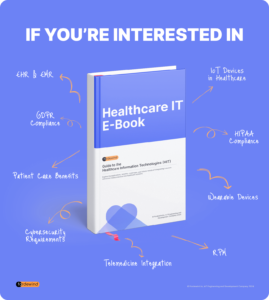Cybersecurity Considerations for IoT in Healthcare

The healthcare industry has the potential to undergo a substantial transformation with the implementation of IoT technology, but with this comes increased concerns around cybersecurity. As more medical devices and systems become connected, the risk of cyber-attacks and data breaches also increases.
One of the most significant cybersecurity considerations for IoT in healthcare is the protection of patient data. Medical records and other sensitive information need to be kept secure and confidential. This can be achieved by using encryption technologies, such as Transport Layer Security (TLS) and Secure Sockets Layer (SSL), to secure the transmission of data between devices and systems.
Authentication and access control are critical cybersecurity measures that can prevent unauthorized access to medical devices and systems. Passwords and multi-factor authentication can be used to verify the identity of users and ensure that only authorized personnel have access to sensitive data.
Software updates and patch management are essential cybersecurity measures that can prevent vulnerabilities and reduce the risk of cyber-attacks. Medical devices and systems need to be regularly updated with the latest security patches to ensure that they are protected against known vulnerabilities and threats.
Monitoring and incident response are critical cybersecurity considerations for IoT in healthcare. Healthcare providers need to monitor their systems and devices continuously to detect any suspicious activity or potential cyber-attacks. In the event of a cyber-attack, healthcare providers need to have a well-defined incident response plan in place to minimize the impact of the attack and prevent any further damage.
Physical security is often overlooked in cybersecurity considerations for IoT in healthcare. Medical devices and systems need to be physically secured to prevent unauthorized access or tampering. This can be achieved through the use of locks, alarms, and other physical security measures.
Consequently, using IoT in healthcare brings many benefits, but it also comes with increased cybersecurity risks. Healthcare providers need to take cybersecurity considerations seriously and implement appropriate security measures to protect patient data and prevent cyber-attacks. By protecting data, implementing authentication and access control measures, regularly updating software, monitoring systems and devices, and ensuring physical security, healthcare providers can reduce the risk of cyber-attacks and improve the overall security of IoT in healthcare.
Fordewind.io is an IoT engineering and development company based in Kyiv, Ukraine. Our main areas of interest and expertise are the automotive industry and Smart Home/City projects. Contact us right now without a doubt and learn more about how we can help you build the future.
